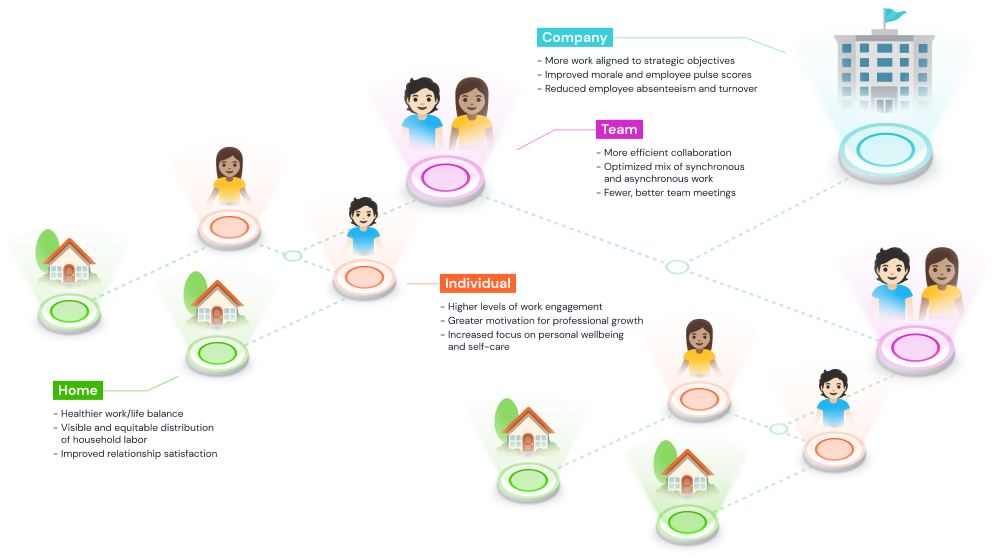When given the opportunity to work from home, 87% of us choose that option – but what if you would like to be one of those people and your manager prefers people in-office? How should you approach the conversation?
Any conversation with a manager where you ask to change the status quo can be challenging, but this can also be a great opportunity to show your independence and responsibility as an employee. Here are some tips for how to approach the conversation with your boss:
Before the Meeting
Your goal here is to enter the discussion well-prepared to make a good business case. That involves research and a plan. As a minimum, do the following:
- Research existing policy: Some organizations have a formal position on remote work, and being aware of this can help frame the conversation with your manager.
- Talk to colleagues: If you have colleagues that currently work remotely, ask them about their experience and how they went about making the case to work remotely.
- Gather research that remote works well: If you cite reputable sources, you can provide your boss with a well-informed perspective on the potential benefits of remote work. Examples of well researched studies include – a study by the Harvard Business Review found that remote workers are often more productive and less likely to quit their jobs than on-site workers (Gajendran, Harrison, & Van Dyne, 2007). Other research has found that remote work can lead to increased satisfaction and work-life balance for employees (Beauregard, Henry, & Leverty, 2018).
- Gather evidence on how to make it work: BillionMinds has a report: How to Make Remote Work, Work. These resources can help managers think of remote work arrangements as a source of strategic advantage rather than a difficulty to be overcome.
- Prove YOU can do remote work: BillionMinds offers remote work certification packages for both employees and managers, and you can get a “Fundamentals of Remote Work” certificate within 2 weeks.
- Build a plan: Think about how you will make this arrangement work well for you, your colleagues, and your manager. This could include goals, timelines, expected working hours, and communication strategies.
During the Meeting
The preparation you have done puts you in an excellent position to have a clear dialogue. As you enter the discussion, be aware that your manager may have reasons that remote work is unfamiliar to them. For example, they may not have received enough training to understand how to manage remote or hybrid teams. So be prepared to compromise and understand that you may not come to an agreement in the meeting itself. Here are some specific tips on how to run the meeting that we’ve seen work:
- Be clear about your reasons: Be clear about your reasons for wanting to work remotely, and how it will benefit both you and the company. Perhaps you have a long commute, need more flexibility to balance personal obligations, or just find it more productive to work from home.
- Be realistic: Be realistic about your expectations and acknowledge the challenges that come with working remotely. Demonstrate how you plan to improve your skills, and how you will deal with issues.
- Demonstrate your readiness: If you have gained your Fundamentals of Remote Work certificate, show it to your manager, and explain how you are working toward the Remote Work Professional certification. (Note: you may tweak this based on your relationship with your manager. Some managers will see this as evidence of your seriousness – others would prefer you to discuss any professional development plans with them beforehand)
- Propose your plan: Come prepared with a detailed plan for how you would like to work remotely, including specific goals, timelines, and communication strategies. Be open to feedback and suggestions from your manager and be willing to compromise if needed.
- Emphasize your commitment: Make sure your manager knows that you are committed to the company and the success of your team, and that working remotely will not compromise your productivity or availability.
- Help the manager see the benefits to them: Remote and hybrid work environments are the future. This is an opportunity for your manager to develop the skills of managing remote and hybrid teams with a willing accomplice (you). If you are going through your remote work professional certification, make your manager aware that the Remote/Hybrid Manager certification is also available and is integrated with your own training.
By following these tips, you can increase your chances of successfully persuading your boss to allow you to work remotely. Remember, the key is to be proactive, communicate clearly, and demonstrate your reliability and responsibility as an employee.
How Can You Increase Your Chances?
If you are not working remotely already there may well be some resistance to it in your organization. Bear in mind that unless you report directly to the CEO the resistance may not just be from your manager. They may be operating in a climate that currently is opposed to remote work, or is looking to bring employees back the office. If you understand this, it will help you approach the negotiation more effectively.
If you are running into difficulty persuading your manager, here are three strategies that you can try:
- Prove your skills first: In this scenario, you START by gaining your Remote Work Professional Certification. After you have accomplished this, your manager lets you work remotely.
- Start slow: In this scenario, you start by working 1 or 2 days out of the office, then gradually increase over time as you show that it works
- Trial period: In this scenario, you work outside of the office for 1 month, and have weekly discussions with your manager to see what can be improved. After a month you discuss if or how the trial can be made permanent
You may find that by using one or even all of these strategies you can begin start your path towards working remotely. The path may not be straightforward, but the good news is that by going through this negotiation you will learn more about how to do great work outside the office, and how to make it work for you AND your organization. Good luck!

